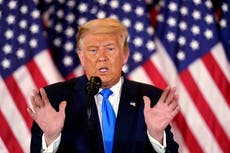Trump ‘offering out pardons like Christmas gifts’, report says
Everyone from Joe Exotic to the president himself is under consideration, while Eduard Snowden has asked for Julian Assange to be added to the list
Your support helps us to tell the story
From reproductive rights to climate change to Big Tech, The Independent is on the ground when the story is developing. Whether it's investigating the financials of Elon Musk's pro-Trump PAC or producing our latest documentary, 'The A Word', which shines a light on the American women fighting for reproductive rights, we know how important it is to parse out the facts from the messaging.
At such a critical moment in US history, we need reporters on the ground. Your donation allows us to keep sending journalists to speak to both sides of the story.
The Independent is trusted by Americans across the entire political spectrum. And unlike many other quality news outlets, we choose not to lock Americans out of our reporting and analysis with paywalls. We believe quality journalism should be available to everyone, paid for by those who can afford it.
Your support makes all the difference.On the twelfth day of Christmas, reports suggests Donald Trump may send anyone he's ever spoken to a pardon in a get-out-of-jail-free card, even if they haven't asked for one.
In a report from Axios quoting sources with direct knowledge of White House conversations, the president is blindly discussing pardons "like Christmas gifts" not just to specific requests but to "every person who ever talked to me".
Mr Trump has reportedly been relishing the authority to grant pardons preemptively, and has been interrupting meetings to ask if anyone wants to be added to his list, which he'll no doubt be checking twice.
Sources quoted in the report, however, were unclear as to whether Mr Trump was being serious or joking.
Some advisers felt awkward being put on Mr Trump's naughty or nice list, saying they didn't believe they had committed any crimes that would require a presidential pardon, and receiving one could hurt their public image.
Christmas has already come early for some of Mr Trump's inner circle, with former national security adviser Michael Flynn receiving one of his first pardons that reportedly sets a template for a wave of pardons to come for friends and loyalists.
That could include everyone from Rudy Giuliani to Joe Exotic, if the president's tweeting habits are to be believed.
Mr Trump retweeted a post from Matt Gaetz in November that he should pardon everyone in his administration in anticipation of the bloodlust from the Democrats – including himself.
While Twitter is outside the traditional request formalities of the pardon process, which White House attorneys are said to also be working through, high-profile candidates at the top of many Christmas wish lists have been making submissions directly to the president.
Former National Security Agency whistleblower Edward Snowden asked Mr Trump to pardon WikiLeaks founder Julian Assange.
"Mr President, if you grant only one act of clemency during your time in office, please: free Julian Assange. You alone can save his life," Mr Snowden said in a tweet.
Although he didn't ask for one himself, Mr Snowden has been floated as having prime pardon potential, with Democrat lawmaker Tulsi Gabbard joining the chorus calling for his freedom as someone who "at great personal sacrifice, exposed the deception and criminality of those in the deep state".
What remains unclear is whether Mr Trump intends to pardon himself in anticipation of future potential legal issues, and, if he does, whether it would be in any way legal.
While he has declared he has the "absolute right" to issue himself a pre-emptive pardon, legal experts are divided on whether it is legal under the Constitution.
Left vague by the Founding Fathers and never tested in the courts, the legality of a personal presidential pardon could be challenged by some future charge of criminality for which the pardon could be used as a defence.
The court would then rule on the text of the Constitution, which says “power to grant reprieves and pardons for offences against the United States, except in cases of impeachment”.
“You could say, implicit in the definition of a pardon or implicit in the notion of granting a pardon – because the Constitution uses the word ‘grant’ – is that it’s two separate people,” Brian Kalt, a law professor at Michigan State University, told The Associated Press. “You can’t grant something to yourself. You can’t pardon yourself.”
That legal theory was cited in a 1974 opinion from the Justice Department’s Office of Legal Counsel that said “it would seem” a president could not pardon himself – issued just days before President Richard Nixon resigned following the Watergate scandal.
The workaround, it suggested, was a president resigning and transferring presidential power to the vice president to issue the pardon.






Join our commenting forum
Join thought-provoking conversations, follow other Independent readers and see their replies
Comments